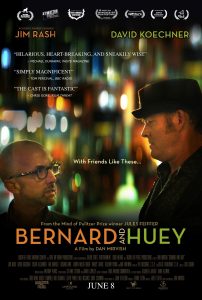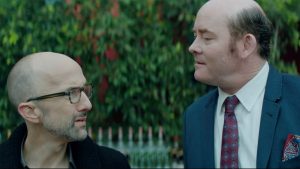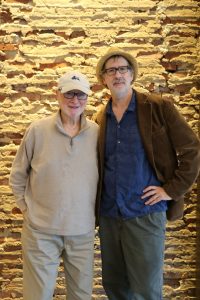A Conversation with Dan Mirvish (BERNARD AND HUEY)
 I met with director Dan Mirvish (Between Us) – co-founder of the Slamdance Film Festival – on Saturday, September 16, 2018, at Baltimore’s Maryland Film Festival-owned Parkway Theatre, to discuss his new narrative feature, Bernard and Huey, which is available now on all digital platforms (and which Don Simpson previously reviewed for our site). Based on a long-ago written and recently excavated script by famed Pulitzer Prize-winning cartoonist Jules Feiffer, the film offers a sardonic look at toxic male sexuality and ego, particularly of the midlife-crisis variety. With Jim Rash (Dean Pelton on NBC’s Community) and David Koechner (Priceless) as the titular duo, the movie provokes both laughter and righteous rage at the fact that these types of men exist and are, in fact, quite common. And yet, they also each exhibit enough charm to remain interesting, despite their never-ending narcissism. Here is a condensed digest of our conversation, edited for length and clarity.
I met with director Dan Mirvish (Between Us) – co-founder of the Slamdance Film Festival – on Saturday, September 16, 2018, at Baltimore’s Maryland Film Festival-owned Parkway Theatre, to discuss his new narrative feature, Bernard and Huey, which is available now on all digital platforms (and which Don Simpson previously reviewed for our site). Based on a long-ago written and recently excavated script by famed Pulitzer Prize-winning cartoonist Jules Feiffer, the film offers a sardonic look at toxic male sexuality and ego, particularly of the midlife-crisis variety. With Jim Rash (Dean Pelton on NBC’s Community) and David Koechner (Priceless) as the titular duo, the movie provokes both laughter and righteous rage at the fact that these types of men exist and are, in fact, quite common. And yet, they also each exhibit enough charm to remain interesting, despite their never-ending narcissism. Here is a condensed digest of our conversation, edited for length and clarity.
Hammer to Nail: So, in addition to being a film director, you are also co-founder of Slamdance, and how you came to make Bernard and Huey is sort of tied to your Slamdance connection, as I understand it, in terms of how you met Jules Feiffer. Is that correct?
Dan Mirvish: Yeah, sort of, tangentially, in a couple of ways. My last film, Between Us, was an adaptation of an off-Broadway play. It was more of a drama, and Carnal Knowledge was a big influence on us in the writing, the cinematography, and everything. And so, while I was in post-production on that, I thought, “Oh, I wonder what happened to the guy who wrote Carnal Knowledge?” And I knew it was Jules Feiffer. I knew a little bit about Jules, but not much.
I start googling him, and you know, was happy to see he was still alive and kicking and doing graphic novels now. And basically, I read this interview with him in, I think, The Chicago Sun Times, and it sort of gave this whole update of, you know, he’s living in the Hamptons, he’s teaching and doing graphic novels and still involved with the theater. And at the very end of the article, it said he had several unproduced screenplays. And I thought, well, whatever they are, they’re probably good or at least worth reading. Here’s a guy who’s won a Pulitzer, an Oscar, couple of Obies and has a Tony nomination, you know, that’s better than an EGOT…that’s a POOTIN…you know, very popular these days…
HtN: (laughs)
DM: And I knew he’d worked with Robert Altman on Popeye. It turns out he knew Altman for years before that, too. And my producing partner is Dana Altman, who is Robert Altman’s grandson. So, Dana and I sent him an email, and we tracked him down, which still took a little bit of effort. I found his email, and said, “Oh, we read about these unproduced screenplays, you know, I’d love to take a look at them.” And he goes, “Yeah, I think I’ve got some stuff, but I’ve been divorced so many times, everything’s in storage. I don’t know where anything is. Try me again in 4 months. Maybe I’ll have found something by then.” “Okay, sure.”
Meanwhile, I’m finishing my movie. We’re starting on the festival circuit. 4 months roll around, and I bug him again. “Yeah, I still haven’t found anything. Try me again in 4 months.” This went on for a year-and-a-half. Over the course of that time, I met his daughter, Halley Feiffer, at Slamdance. She had a film called He’s Way More Famous Than You, that she wrote, produced, and starred in. And actually, there is a character called Jules Feiffer in it. Anyway, it was a complete coincidence, as I wasn’t involved with programming that year, so I just met her. So, I asked her about these scripts, and she had no idea. She didn’t know where any of these scripts were, either, so it didn’t really help. But it was a nice way to kind of keep the correspondence up. Jules was very happy that his daughter was at Slamdance.
And then, finally, my friend Kevin DiNovis, who is another Slamdance guy – he directed Surrender Dorothy, which won our Grand Jury Prize in 1998 – knew I was having this correspondence with Jules, and he said, “Oh, I think I remember reading one of these screenplays. It was in Scenario magazine.” And Scenario was a magazine in the ’90s, late ’90s, that would publish, mainly, produced screenplays, but every now and again have unproduced ones. And I said, “Well, that’s great, Kevin. Do you still have copies of your magazine?” He goes, “Oh, no, I just got divorced. They’re in storage. I don’t know where anything is.” So…
HtN: Divorce is a common theme here.
DM: Very common theme.
HtN: With people not being able to find things.

Our Chris Reed and filmmaker Dan Mirvish
DM: Oh yeah! And then, there was this other guy, a friend of mine who’s a writer in L.A. Our sons are friends, and I said, “Oh, my friend Kevin just said that he’s got Scenario magazines. There’s a Feiffer script in there.” And my friend says, “Oh yeah, I had Scenario magazine, too.” And I said, “Well, do you have your copies?” He goes, “No, I just got divorced. They’re in storage. I don’t know where anything is.” (laughs)
Anyway, so pretty much the only library in America that still has Scenario is the Academy library. The Academy of Motion Picture Arts and Sciences is the Oscar people. They have a library in L.A., which is not far from where I live. And so, I went there and found the magazine. It was actually their very first issue that had Bernard and Huey in it. So, I read it and really liked it and thought it would fit my wheelhouse of what I could do, thematically, production-wise and budget-wise. I thought, “Oh, this is something I could maybe wrap my head around.” And it also had a nice little article that explained how the whole history of this is based on these characters that came from the Village Voice.
HtN: Right. Because he has also this collection called The Unexpurgated Memoirs of Bernard Mergendeiler, so he’s clearly been obsessed with these characters for some time.
DM: Yeah. These characters, they show up in all his works, in the cartoons, in his plays, and books. They started with his earliest cartoons in 1957 in the Voice, but then from ’82 to ’85 there was a regular monthly, six-panel strip in the back of Playboy magazine – for all those people reading Playboy for the cartoons, they would have noticed this – called Bernard and Huey. And it was now kind of the middle-aged versions of these characters. And then, Showtime had commissioned him to write the script. He wrote the script, but the week he turned it in, they changed ownership, and they changed their whole business model to, I don’t know, comedy or boxing or whatever it was. And they said, well, we’re not interested in the script anymore. They didn’t pay him for it. They just gave it back to him. And he had a producing partner, a guy named Michael Brandman – and the article spelled his name wrong, which becomes important later – who tried to get it made as a Hollywood film and had no luck. And in the mid-’80s, there wasn’t as much, you know…it was sort of either all or nothing, like studios or nothing. There were not as many…
HtN: This is pre-1990s indie movement.
DM: Exactly. Yeah. So anyway, that was it.
HtN: Pre-you, in fact.
DM: Pre-me.
HtN: Pre-Slamdance.
DM: Exactly.
HtN: Which helps fuel that indie movement along…
DM: Yes. So, I called Jules, and he said, “Oh yeah, Bernard and Huey. That’s the one. I didn’t even know what we’re looking for most of this time. But I think my assistant might’ve sent them an abridged version.” It may not have been the full thing because in a magazine format, it’s a little hard. Couldn’t just count the pages. They’re formatted differently. And I said, “Well, that’s great. Let’s call your old assistant. Maybe she has a floppy disk or something.”
HtN: But she was divorced and couldn’t find anything.
DM: No, worse. She’s dead.
HtN: Oh, that is worse.
DM: Yeah. So, no, she’s dead. And I said, “Well, what about your agent? You had a big Hollywood agent at that time.” “No, he’s dead too.”
HtN: Oh, my goodness.

Jim Rash and David Koechner
DM: And I said, “Well, you know, what about your lawyer, you know?” “No longer among the counted. He is dead.” And I go, “Oh my God. What about this producer?” I had been trying to find this producer, too. I had written down the name of the guy, and no sign of him on IMDb or IMDbPro. Nothing. And Jules is like, “Oh yeah, they spelled his name wrong. Here’s the real spelling of his name.” And so then, I tracked him down, and he was alive, still working as a producer, still in Hollywood, still married, still had his archives. And he had the original handwritten copy of the script. Or no, sorry. He had the typed, final version of the typescript.
HtN: Unabridged.
DM: Yes, unabridged, and he was more than happy to see this getting some life into it. And so, he gave that to us. And then a couple months later, I realized that Jules had actually donated some of his archives, about a dozen years earlier, to the Library of Congress. So, I had a buddy in DC go there, and we found the handwritten copy of the script, because Jules never learned to type because he always had the dead assistant to do the typing. So, we found the original handwritten copy on yellow legal pads that had little doodles of Bernard and Huey in it. And it even had the dead lawyer’s phone number written in it. And then at some point, Jules said, “I’m 87. When are we making this thing already?” And I said, “Oh no, now we’ve got to make it.” You know?
HtN: So, this film is fascinating as a study of male narcissism…libidinous narcissism. What attracted you? I mean, I realize that there weren’t necessarily, like, 100 scripts by Jules Feiffer, and at this point you were just interested in making a film by Jules Feiffer.
DM: Yes.
HtN: But you said that it somehow was interesting to you when you found it.
DM: Yeah.
HtN: So, what attracted you to it? Because I found the characters simultaneously fascinating and repellent.
DM: Yes, of course. Which is the point, right?
HtN: Sure.
DM: And the thing is I’m about the same age as the characters are. And the same age that Jules was when he wrote it. And so, even though I’m a happily married guy, I have plenty of friends like that. Most of my filmmaker friends are divorced, or never married, or still trying to date. And, you know, this is the nature of men. We are both fascinating and repellent at the same time. So, I can definitely relate to it, and you know, if there’s one theme in all my work, it’s that the characters tend to be about the same age as I am. You know, when I was in my twenties, I made films about people in their twenties, and in my thirties…I think a lot of filmmakers are like that.
HtN: Sure, that’s part of what attracts me to the Richard Linklater “Before” series, because I’m basically the same age as those characters, so I like watching them get older along with me.
DM: Yeah. Yeah.
HtN: So, within the world of the movie, given how simultaneously fascinating and repellent these guys are, what do you think makes them interesting to the women in that world? Because clearly, at various times, they’re able to find women who put up with them. Like, you build this really interesting world where they sort of turn women off, but then also seem to attract them.
DM: Yeah. And that was funny. Jim Rash and I talked a lot about this when we were first meeting, and throughout the production. Like, why would these women be interested in Bernard?
HtN: (laughs) Or Huey. I did like the trajectory of how the behavior that had not worked for one guy at all in the ’80s was now kind of what was interesting to people in their late forties, or to the women in their late forties. They had flip-flopped. Neither of them had really evolved, but the times had changed to make one now more successful than the other. I found that aspect of the story quite interesting.

THE Jules Feiffer and Dan Mirvish
DM: Well, in the first instance, taking Bernard, particularly when we first meet him. He’s successful. He has this big apartment in New York. He must be wealthy. But then you see him in his office, and it’s…
HtN: It’s nothing. And the attraction wears off once people realize how self-involved he is.
DM: Yeah, of course. And then he has this long-term relationship with Roz, and you know, she’s in it for whatever her reasons are, clearly not for the apartment. She has a perfectly good apartment herself, which is why she’s in and out of his life.
HtN: How did you get your cast? You’ve got this amazing cast that includes Mae Whitman, Jim Rash, David Koechner, Sasha Alexander, Nancy Travis, and Eka Darville, of Jessica Jones fame. And I also really liked the casting of the young Bernard and Huey, too. How did you find these people?
DM: So, we had a casting director, but I also maintain relationships with a lot of agents and managers on the talent side. And so, you know, we just sent the script out to all agents and managers, and said, “Who do you think would be good?” With independent film, it’s very much about availability, and scheduling, and who wants to do this or that. And you don’t always know, if someone’s done a sitcom for seven years, that now they really want to do this kind of indie film. And honestly, the agents and managers have a much better sense of that than you would coming into it.
And also, you know, we – Jules and I talked about this too, a lot – we weren’t specifically looking for people that look like the cartoon. I mean, we looked at people – tall, fat, skinny, black, white – but it was really more about the relationship between the two. In the end, we got two guys who look exactly like the cartoon, but it just kind of worked out that way. So, of the cast, I think we got Koechner first. He had been in a couple of Slamdance films, and so I knew some of the directors that he’d worked with. They said good things about him. He’d been to Slamdance. He was in a film called Dill Scallion and had come to the festival.
HtN: He’s been in so many films. He’s such a prolific character actor.
DM: Oh, yeah. And he just loves to work. He’s got five kids and lives in L.A., and he just loves to get out of the house, I think. (laughs) But come back to them at night! So, if it’s in L.A., it’s attractive to him.
HtN: But you shot in New York, right?
DM: No.
HtN: No?
DM: Well…
HtN: The exteriors are in New York.
DM: Yeah.
HtN: But everything else is in L.A.?
DM: Yeah. We shot 14 days in L.A. and 2 days in New York.
HtN: Only 2 days?
DM: Yeah.
HtN: Well, you fooled me.
DM: Yeah, surprise!
HtN: That’s good. Nice job with exteriors.
DM: Yeah, thanks. So, Koechner had just done Krampus, which I haven’t seen, but I heard a podcast interview with Adam Scott, whom I knew a little bit, and he was saying great things about working with Koechner. And it was a change of pace for him, and he’d done a couple of other indie films lately. It hasn’t all been Anchorman movies.
HtN: Right. Which I would say, for my money, is the least interesting work he’s done, in many ways, though still funny.
DM: Yeah. So, for him, it was a chance to do something that had a bit more depth and gravitas, and he was excited to do it. And at the time, we also had an offer out to Don Cheadle for Bernard. He’s like, “Oh yeah, I get to work with Cheadle!” And I was like, “Yeah, well don’t count on that.”
HtN: That would have been interesting.
DM: It would have been. Yeah. We’re still waiting on Cheadle to get back to us.
HtN: Just insert him later in the film.
DM: (laughs) Yeah. Exactly. But no, so Koechner was excited to be in it, and more importantly, it fit his schedule.
HtN: Right. So, that’s Koechner. How did you get Rash, then?
DM: Rash was a weird twist of fate. So, we were getting pretty down to the wire, and we still hadn’t cast our Bernard. I’d met with other actors. We didn’t have anyone. And I was still raising money, too, as one does, down to the wire. And I had this big list of production companies that I’ve kept for, like, 20 years, you know, and it’s my big financial-prospects list. And it’s just production companies, and rich people, and different things like that. I’m just literally dialing for dollars. I’m going through this list. I didn’t even know who half these companies are anymore.
And I call this one company and I get the assistant on the phone and say, “Hey, can I talk to your boss?” “What’s it about?” And I said, “I’m raising money for this movie.” “Oh, what’s it called?” I said, “Bernard and Huey.” He goes, “Bernard and Huey? I love that script.” “Wait, how have you read the script? I just called you now.” He goes, “Oh, well, we’re also a management company. Some production companies are also management companies, and we’ve seen the script and we just pitched Jim Rash to your casting director.” And I go, “Really? Oscar-winner Jim Rash?” That would look really nice on a poster! And I said, “My casting director didn’t mention it. That’s a really good idea.”
And so then we offered it to Jim, and I met with him. And actually, right before meeting with him, I realized he had been in some films with Slamdance directors. He’d been in Sky High, that Mike Mitchell directed.

Dan Mirvish
HtN: Mike Mitchell is a Slamdance director?
DM: Yeah. We showed his first short, called Herd.
HtN: Yeah, I’ve seen it, and actually met Mike Mitchell years ago, as we have a friend in common.
DM: Oh, great. So, Herd won our first Spirit of Slamdance award. The first time we gave that award, we gave it to Mike, and you know, 9 months later he was directing Deuce Bigalow.
HtN: Right. So, who was Jim Rash in Sky High?
DM: So, there’s the evil woman, right?
HtN: Yeah. Played by Mary Elizabeth Winstead.
DM: Exactly. So, her henchman that she pretends is her father, but it’s really her henchman?
HtN: That’s Jim Rash?
DM: That’s Jim Rash.
HtN: I’ll have to go back and check it out. I have the film at home.
DM: It’s great. It’s like one of our favorite films in my own home. Totally underrated.
HtN: Yeah, yeah. I love the film.
DM: Yeah, and strangely I had not watched a lot of Community, so I didn’t really know him from that. But I knew him from Sky High. But I knew he knew the Russo brothers, because they had directed episodes of Community, and actually also put him in one of the Marvel movies, in Captain America: Civil War. I think he plays like a Dean at MIT, or something like that.
HtN: Oh, interesting.
DM: And so anyway, right before I met with him, I texted Joe Russo, and Joe’s on the set of Infinity War, you know? But he got back to me right away because I said, “Oh, how’s Jim Rash to work with?” And he’s like, “He’s terrific. Cast him.” I was like, “OK, that’s good enough for me.” So, I met with Jim. We also both knew Alexander Payne, too, because he won the Oscar for co-writing The Descendants. So, we had some nice points of coincidence with our mutual contacts. But again, it was timing for him. He had just come off of Community, and played that very distinctive Dean Pelton role and really wanted to do something different.
HtN: Sure.
DM: You know? And he doesn’t get cast as a lot of romantic straight leads. And more importantly, he had time. He was getting ready to write a script with his partner, Nat Faxon, but Nat was on a sitcom, and so he kind of had to wait a little bit to work with Nat on that thing. And he’s also…Jim was also what we call Hollywood homeless. He had just sold his house and hadn’t bought a new house. He was unemployed. He was literally homeless and unemployed. But of course, Hollywood homeless means he was living in his friend Joel McHale’s pool house. So, he was doing fine. Let’s be clear. But anyway…he had time. You know, he was like, “Oh yeah, this sounds fun.” And then, he had a connection to Feiffer in that, when he was in college, he had been in Feiffer’s People, the play, which has a couple Bernard and Huey scenes in it.
HtN: That’s great.
DM: And we just hit it off, and it was…he and Koechner didn’t know each other, which is kind of surprising because they’ve both been in so many different things. But they certainly knew lots of mutual people.
HtN: Right. Well, they work really well together, and I think their dynamic really helps make the film. Congratulations on making it, after all that!
DM: Thanks!
– Christopher Llewellyn Reed (@ChrisReedFilm)











